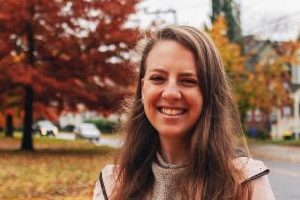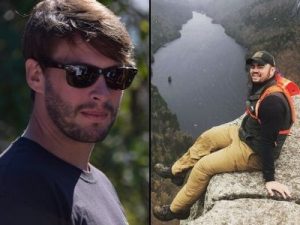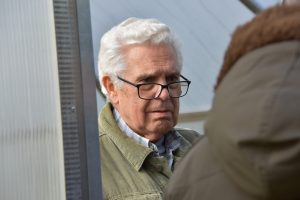
Rachel Lindsay ‘05 is an ecological designer, artist, and local food advocate. She is a worker-owner at Regenerative Design Group, a small firm based in Western Massachusetts. Rachel holds an MS in ecological design from The Conway School and a BA in anthropology from Wesleyan. As a Wes student, she was one of the founders of Long Lane Farm!
profiles
profiles of our coe students, faculty and alumni.
o’donnell ’19 takes action at climate museum
 Maggie O’Donnell ’19 is the research and program associate at The Climate Museum in New York City, where she coordinates new aspects of the Museum’s online presence including the Online High School Internship Program and the Climate Ambassador Card. Maggie was a religion and environmental studies major and art history minor at Wesleyan and a member of our 2018-19 COE Think Tank.
Maggie O’Donnell ’19 is the research and program associate at The Climate Museum in New York City, where she coordinates new aspects of the Museum’s online presence including the Online High School Internship Program and the Climate Ambassador Card. Maggie was a religion and environmental studies major and art history minor at Wesleyan and a member of our 2018-19 COE Think Tank.
edwards ’21 contributes to higher ed toolkit for displaced students
 Lizzie Edwards ’21 (she/her) double majored in Anthropology and Environmental Studies and minored in Middle Eastern Studies. While at Wesleyan, her senior capstone project, Politics of Thirst: Privatized Water, the Shadow State, and Citizenship Claims in Jordan, examined how water has become a key medium in which state responsibility is being privatized as well as the water access of refugees, low-income Jordanians, and elite residents. Here she shares her experience volunteering with the Student Voices for Refugees program of the University Alliance for Refugees & At-Risk Migrants (UARRM).
Lizzie Edwards ’21 (she/her) double majored in Anthropology and Environmental Studies and minored in Middle Eastern Studies. While at Wesleyan, her senior capstone project, Politics of Thirst: Privatized Water, the Shadow State, and Citizenship Claims in Jordan, examined how water has become a key medium in which state responsibility is being privatized as well as the water access of refugees, low-income Jordanians, and elite residents. Here she shares her experience volunteering with the Student Voices for Refugees program of the University Alliance for Refugees & At-Risk Migrants (UARRM).
celebrating our 2021 envs majors!
Congratulations to the class of 2021! Read on for more about some of our 31 class of 2021 ENVS majors!
Sanya Bery: My thesis title is A Walk in the Neighborhood: Exploring the Crucial Role That Small Municipalities Play in the Face of Climate Change. Super excited to announce that I will be joining the University of Michigan-School for Environment and Sustainability’s master’s program, with a concentration in Sustainability and Development in Fall 2022. Thank you so much to everyone who has helped me reach this point in my life. I’m thrilled for the adventures that this coming gap year holds and for all to come in the future!
Liana Biasucci: My capstone is an essay called How to Build Back Better: Greening the Recovery from COVID-19, about using government stimulus packages to advance climate mitigation in the US and combining economic goals with environmental ones. Next year I’ll be working in DC doing sustainability consulting. What I’ve learned most from ENVS is how multifaceted environmental problems are and that to have true solutions we need to look at all impacts of policies and actions.
 Lizzie Edwards: My senior essay title is Politics of Thirst: Privatized Water, the Shadow State, and Citizenship Claims in Jordan. My essay examines the different water realities of residents of different socio-economic classes within Jordan. I argue that water has become a key medium in which state responsibility is being privatized and relationships to the state are being negotiated. I will be a member of the CBYX for Young Professionals cohort for 2021-2022 academic year! This fellowship is a fully-funded public diplomacy program through the U.S. government and German government that is offered to 75 Americans every year. I will be studying German intensively for two months, taking college classes in Arabic and migration studies (most likely in German) for a semester, and interning in the field of refugee resettlement for five months. I hope to learn firsthand how organizations in Germany are welcoming refugees and immigrants as well as combatting anti-refugee and immigrant sentiment. From being an ENVS linked major, I’ve learned how to more adeptly discuss environmental issues in an interdisciplinary space. My advice for future ENVS classes is to take classes outside of their comfort zones.
Lizzie Edwards: My senior essay title is Politics of Thirst: Privatized Water, the Shadow State, and Citizenship Claims in Jordan. My essay examines the different water realities of residents of different socio-economic classes within Jordan. I argue that water has become a key medium in which state responsibility is being privatized and relationships to the state are being negotiated. I will be a member of the CBYX for Young Professionals cohort for 2021-2022 academic year! This fellowship is a fully-funded public diplomacy program through the U.S. government and German government that is offered to 75 Americans every year. I will be studying German intensively for two months, taking college classes in Arabic and migration studies (most likely in German) for a semester, and interning in the field of refugee resettlement for five months. I hope to learn firsthand how organizations in Germany are welcoming refugees and immigrants as well as combatting anti-refugee and immigrant sentiment. From being an ENVS linked major, I’ve learned how to more adeptly discuss environmental issues in an interdisciplinary space. My advice for future ENVS classes is to take classes outside of their comfort zones.
Phoebe Landsman: In my project, Combatting Politicization and Polarization: Re-Framing Climate Change to the American Public, I researched ways to re-frame climate change to appeal to the American public and combat the stagnancy surrounding climate policy in the United States. After graduation, I will be working for an immigration law firm in Boston! I love that everyone comes into the ENVS major with different interests and approaches to environmental studies. I have truly learned so much from my classmates and teachers.
thornton ’20 brings meaning to chaos through poetry
 Melissa Thornton ’20 is a current College of Environment Think Tank fellow from Atlanta, Georgia, and a winner of this year’s Sophie and Anne Reed Prize for best poem or group of poems at Wesleyan. A double major in the COL and French Studies, Melissa shared her thoughts on the importance of poetry in times of chaos.
Melissa Thornton ’20 is a current College of Environment Think Tank fellow from Atlanta, Georgia, and a winner of this year’s Sophie and Anne Reed Prize for best poem or group of poems at Wesleyan. A double major in the COL and French Studies, Melissa shared her thoughts on the importance of poetry in times of chaos.
get to know our envs military vets: freiburger ’21 & snashall ’21
 The Posse Veteran Scholars Program identifies talented veterans interested in pursuing bachelor’s degrees, and places them at top tier colleges and universities, where they receive four-year full scholarships. Each year, Wesleyan accepts a “posse” of 10 veterans. Today, on Veterans Day, we honor all U.S. military veterans by shining the spotlight on two of our own: Gabe Snashall ’21 and Michael Freiburger ’21.
The Posse Veteran Scholars Program identifies talented veterans interested in pursuing bachelor’s degrees, and places them at top tier colleges and universities, where they receive four-year full scholarships. Each year, Wesleyan accepts a “posse” of 10 veterans. Today, on Veterans Day, we honor all U.S. military veterans by shining the spotlight on two of our own: Gabe Snashall ’21 and Michael Freiburger ’21.
You’re both Posse Veterans here at Wes, class of 2021. Why did you join the military and what was your role?
Michael Freiburger (MF): I joined the Army right out of high school. I didn’t know what I wanted to do in life, and college wasn’t an option, but I knew that I needed to get out of my hometown. I spent the majority of my service at Fort Bragg North Carolina (5 years), and two years station in Germany. I deployed to Afghanistan twice and worked as an Explosive Ordnance Disposal Technician – Bomb Squad.
Gabe Snashall (GS): I joined right after graduating from High School in Fresno, California in 2011. At the time, the unemployment rate in my hometown was +18% and rising, so everybody I knew was leaving to either go to college, the peace corps, or the military. For me, the better option seemed to be a military program that offered college credit, a year or two of formal military training, and, of course, a decent amount of travel experience. Broadly speaking, I chose the military option for the opportunity to focus on and explore what I wanted to do in life, what I wanted to study, and where I wanted to go to school. I found that opportunity with the Naval Submarine Service and left my hometown a short two weeks after signing paperwork. That decision took me to Chicago for bootcamp and Connecticut for Submarine School. I was then stationed on the USS Pittsburgh (recently decommissioned) from 2011-2016, and was deployed to the Middle East, the North Pole, the Indian Sea, the Arctic Sea, and the Caribbean. In fact, I think we sailed the globe over three times while I was on board. On land, we would port in Scotland, Spain, the UAE, and Norway. On ‘The Pit’, I officially served as an Electronics Technician (ET)—specializing in satellite telecommunications, cryptographic operations, and radar and periscope maintenance. Unofficially, my peers knew me as “Snooki,” a nickname that was a reference to, and mostly making fun of, the loud and annoying way I would persuade submarine officers to accept my work requests or proposals. I won’t go into detail here, but the highly chaotic working world on a submarine brings out the most competitive side of all who work on board—so it’s an anything goes world, really.
How did you find out about the Posse Veterans program?
MF: I found out about the Posse Veterans program while I was processing out of the military. I was pretty fortunate that Posse representatives were at Fort Bragg the same week I was in mandatory exit briefs. I was lucky enough to meet with the program that week and began the process that brought me here to Wesleyan.
machado-allison teaches first-ever envs course taught in spanish
This spring, Wesleyan will offer its first-ever ENVS course taught in Spanish, ENVS283/LAST383, Venezuela: The Effect of Oil Discovery on People, the Environment, and Democracy. The course will be taught by Antonio Machado-Allison, former Menakka and Essel Bailey ‘66 Visiting Scholar in the College of the Environment and current research fellow in the College of the Environment. He was recently named a member of the Academia de Ciencias de América Latina.

Tell us about ENVS283. Why are you focusing on Venezuela?
Antonio Machado-Allison (AMA): Being a Venezuelan scholar and witnessing what is happening in my country, one way I think I can help my people is to let citizens of other countries know how Venezuela arrived at these conditions. In the course we will discuss the key factors that have affected the development of Venezuela and its environment from the pre-colonial period to the present through the reading of interdisciplinary literature that includes anthropology, religion, sociology, environmental sciences, law, and history. Ultimately, we will examine the factors that have led to the collapse of democracy in Venezuela.